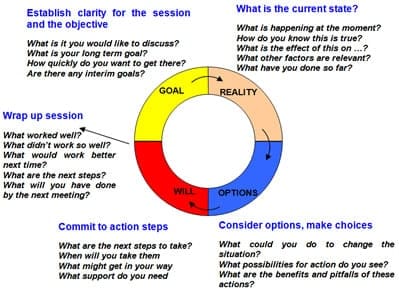GROW coaching model
Overview - The Grow Coaching Model
One of the most common questions asked about coaching is “What process should I follow?” There is no single answer to that, however if it is assumed that coaching is largely a structured interaction about a topic where the coach seeks to ask questions to encourage the other person to develop solutions to the challenge or problem they face, then the GROW model is one of the most popular.
The GROW model describes 2 key elements and a 4 stage process model to develop.
The key elements are
Awareness
Before any change can take place, an individual must become aware of their environment so that they can begin to perceive and judge their own performance. Awareness is recognising what is happening around you and understanding what you are experiencing
Responsibility
When an individual chooses to take responsibility for their thoughts and actions, then their commitment to them increases with a corresponding increase in performance.
The primary role of any coach is to raise both the awareness of an individual to their situation by asking searching and clarifying questions and to ensure that the individual takes personal responsibility to actively pursue any resulting actions. The coach is present to help the individual work out what needs to be done, not to provide the answer.
This is achieved by asking questions rather than giving answers. The GROW model proposes a questioning sequence as follows
Goal Clearly establish the desired end point in a positive, motivating manner
Reality Check the current situation, e.g. resources, attitude
Options What are the alternative strategies or opportunities?
Will What is the commitment to do it, what are they willing to give up to achieve it

Below you will find some example questions that can be used to elicit information on each of the 4 stages of the model. Please be aware that these are only examples to show the different type of questions that could be appropriate. You should not try to ask them all!! – Please also remember that listening is critical to a successful coaching session. You should always listen and then consider the next question based on the response, rather than try to plan out a set of questions in advance.
Coaching Questions
Good questions are an essential part of coaching. Skilled coaches are able to ask questions that naturally seem to arise from what the other person is talking about. They are alert and curious. Alert to staying on the other person’s agenda and curious about how the other person sees the world and in particular, the situation they are describing.
To be a good coach you need to become skilled in the use of questions and know which questions to ask. Asking skilful questions is one of the most effective tools at your disposal as a coach.
This kind of questioning is not about interrogating or putting the other person on the spot. Questioning here is of quite a different nature. It's about deepening our understanding of the other person's position.
There are certain questions that are more or less guaranteed to get people talking and to help you deepen your understanding of their viewpoint. These types of questions usually tend to be open ended questions that encourage the other person to talk more, they are fundamentally exploratory and can be very catalytic. They are characterised by the fact that they always arise and remain on the other person's agenda. You need to build rapport throughout the whole discussion. Rapport is created by a feeling of common values, interests, goals.
Here are some examples of good questions that follow the GROW model
You and your employee will get the most out of a coaching session if you take the time to prepare. Use the GROW questions below to prepare.
Goals Questions
1. What would you want to achieve out of this coaching session?
2. What would you like to discuss?
3. What is your goal for this session?
4. What is the goal you want to work on today?
5. For you to feel this session is useful what do we need to have worked upon today?
6. What do you have at the end of this session that you don’t have now?
7. Why are you hoping to achieve this goal
8. Who else is involved? How will you inform them?
9. What would be of real value to you?
10. How will you measure it?
11. How will you know when you have achieved this goal(s)?
Reality Questions
1. What is the situation now?
2. How is this affecting you?
3. What actions have you already taken?
4. What do you think is stopping you?
5. Do you know other people who have achieved this goal?
6. What is the perception of others?
7. What is working? And what was the effect?
8. What has been your greatest challenge?
9. What did you learn from this?
10. What could you do better this time?
11. One scale 1-10 how severe /serious/urgent this is?
12. what is holding you back from finding a way forward
13. Who needs to know what your plans are?
14. What support do you need?
Options Questions
1. What options do you have?
2. What approach have you considered?
3. What are the pros/cons of your option?
What's the best/worst thing about that option?
4. When do you need assistance? And from whom?
5. What are 3 different ways you could approach this situation?
6. What else could you do?
7. What could be your first step?
8. Who else might be able to help?
9. What do you think I/others would suggest?
10. What would happen if you did that?
11. What is the most challenging part?
12. If you had unlimited time/resources what would you do?
13. What advise would you give others?
14. Which option you feel ready to act on?
15. If you made a list of actions you could take, what would be on the list?
16. How would you prioritize this list?
17. Which option do you feel strongly about? Why?
18. What would you do if you could start again with a clean sheet, with new team?
Will Questions
1. What approach do you intend to use
2. What would happen if you did nothing?
3. What specific steps would you take next?
4. How would these actions move you closer to achieving your goal?
5. How and when will you do that?
6. What are you criteria and measurements for success?
7. What do you need from me/others to help you achieve it?
8. How will you know when you have achieved it?
9. What are 3 actions you can take this week that would get you closer to your goal?
10. On a scale of 1-10 how excited/motivated are you to take these actions?
11. What would happen if you don’t do this?
12. When are you going to start?
13. How will you let me know?
14. What can I do to support you?
15. On a scale of 1-10 how committed are you to this goal?
16. Is there anything else you want to talk about?
For more check out our Coaching People For Better Performance instant download training package.
Coaching & Feedback Related Articles
- Coaching for better performance
- Qualities & Skills of a coach
- Why coaching and feedback goes wrong?
- GROW Coaching Model
- The Body Coaching Model
- Giving Feedback
- Receiving Feedback
- Giving Negative Feedback
- Top 10 Feedback tips
- STAR feedback model
- The 10 Coaching Commandments
- Different types of coaches
- Giving feedback as part of coaching
- Choosing an area to coach to improve performance
- Coaching/Training/Counselling/Mentoring - Clearing out the confusion
- What is coaching all about?

34 Full Courses & 6 Mini Courses
Get all available programs
& save ...!!
Price: $4499.95 $2995.95
Great Value For Money
Read More
|
+ | 
|
The Presenter-Trainer Package®
Train The Trainer
Presenting With Impact
Price: $359.95 $299.95
SAVE $59.95
Read More
Retail Excellence Series®
3 Complete Courseware
Packages in 1
Frontline Retail Selling Skills
Retail Sales Planning & Forecasting
Passionate Retail Experts
Price: $539.855 $349.95
Pay for 2 Get 1 Free
Read More
Sales excellence series®
3 Complete Courseware
Packages in 1
Sales Management
Professional Selling Skills
Sales Territory Planning & Routing
Price: $539.855 $349.95
Pay for 2 Get 1 Free
Read More
Call Center Excellence Series®
4 Complete Courseware
Packages in 1
Handling angry and difficult callers
Call control
Find a way to say YES!
Successful telephone debt collection
Price: $719.95 $449.95
Pay for 2 programs and Get 2 programs Free
Read More
Communication Excellence Series®
4 Complete Courseware
Packages in 1
Communicating with clarity and impact
Negotiating for results
Conflict resolution
Presenting With Impact
Price: $719.95 $449.95
Pay for 2 programs and Get 2 programs Free
Read More
Customer Service Excellence Series®
5 Complete Courseware
Packages in 1
Vision, Energy & Passion To Serve
Pathways to service excellence
Find a way to say YES!
Passionate Retail Experts
Setting others up for success
Price: $899.75 $599.95
Pay for 3 Get 2 Free
Read More
Instant Download
Training packages
All you need
to deliver a great training!
Our training material packages come with all you need to provide
a professional and accelerated learning solution with

High Impact
Power Point Slide Deck
To support immersive learning, a high impact professionally designed power point slide deck to engage trainees at all levels.

Student
Workbook
A comprehensive reference workbook you can give out to your class participants as a quick future reference.

Trainer
Guide
With step-by-step clear directions with tips and suggestions on what to say and how to present each slide.

Activity
/Exercise Sheets
Various training material and support documents to help you both explain and debrief the different exercises, activities and games Plus a fun final Jeopardy style review game as a fun ending for your training program.

Additional
Support Documents
To ensure you have all you need to deliver a complete and professional training program, additional supporting documents are included with each full course material package. From training evaluation forms to 5 different certificate templates that you can edit and hand out to your participants at the end of your training.

Job Aids
& Forms
Specific forms designed to extend and reinforce the training that participants can utilize back on the job to help them apply the new learned concepts (Select training material packages)


